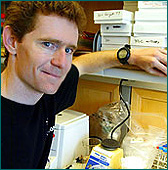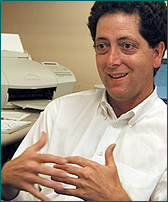
DeRisi, Shokat
Two UCSF professors were named as Howard Hughes Medical Institute (HHMI) investigators, a highly prized honor that carries significant, long-term research support.
The investigators are Joseph DeRisi, PhD, UCSF associate professor of biochemistry, and Kevan Shokat, PhD, UCSF professor of cellular and molecular pharmacology.
They are among 43 scientists from 31 institutions nationwide named as new recipients of the honor.
At UCSF, 15 other UCSF scientists also hold the prestigious HHMI investigator status, among the highest number of any institution.
DeRisi, who holds the Gordon M. Tomkins Chair, helped pioneer the field of microarray technology, in which gene activity is revealed on a glass slide. DeRisi has used the microarrays he designed to make major advances in understanding such infectious diseases as SARS (severe acute respiratory syndrome) and malaria.
Shokat, a leader in the new field of chemical genetics, has developed a number of innovative techniques to tease apart the function of vital signaling molecules, called protein kinases, which are active in all cells. These proteins are responsible for most of the molecule-to-molecule communication in cells -- cascades of signals that direct movement and metabolism, cancer and cell death.
 |
| Joseph DeRisi |
DeRisi's Research Highlights
In 2002, DeRisi and his former postdoctoral fellow used a microarray they had created -- which can detect all known viruses and even those never seen before -- to provide the confirming evidence that SARS was a novel form of a coronavirus. He is now using the high-tech tool to move in on other viruses, as well.
DeRisi's greatest passion, however, is working to illuminate the life cycle and internal regulatory mechanisms of the malaria parasite, Plasmodium falciparum, which infects 200 to 300 million people world wide each year, mostly in tropical climates, such as sub Saharan Africa. The disease kills 700,000 to 2.7 million people annually, mostly children under the age of four.
In 2003, his team identified the full breadth of genetic activity at a key stage of development in the parasite. The discovery of the pronounced level of activity, in which a gene is transcribed into messenger RNA on the path toward producing a protein, points to numerous new potential targets for drug and vaccine therapy.
An outspoken advocate of making scientific findings freely accessible to scientists around the world, many of whom cannot afford to subscribe to scientific journals, DeRisi published his malaria finding in the online, freely accessible science journal Public Library of Science Biology.
 |
Kevan Shokat
Photo by Majed |
Shokat's Research Goals
Shokat's research goals are to understand each kinase's role in the body and to learn which kinases would be good candidates for drug development.
More than 500 different -- but quite similar -- kinases are active in most cells, and determining the role of each is crucial in the effort to control disease by blocking certain signals. But their nearly identical structure has made kinases difficult to study.
Shokat uses genetic engineering to essentially mutate an individual kinase to make it a unique target for a chemical that can control its activity, but not that of the other hundreds of kinases in a cell. In this way, he can isolate the function of individual kinases. The approach is now used by more than 100 university and pharmaceutical laboratories around the world to determine the function of key proteins.
Among other chemical-sleight-of-hand techniques, Shokat invented a technique that allows scientists for the first time to pinpoint where small molecules called phosphates attach to proteins in cells, allowing the cells to send signals and gives organisms a way to adapt to rapidly changing conditions. Diabetes, hypertension and many cancers arise when these simple, nearly ubiquitous molecules bind incorrectly or not all. Mapping their location on proteins should allow researchers to block aberrant binding and treat disease.
A nonprofit medical research organization, the Howard Hughes Medical Institute is dedicated to discovering and disseminating new knowledge in the basic life sciences. The Institute prizes intellectual daring and seeks to preserve the autonomy of its scientists as they pursue their research. HHMI was established in 1953 by the aviator-industrialist and is headquartered in Chevy Chase, Md.
Source: Jennifer O'Brien





